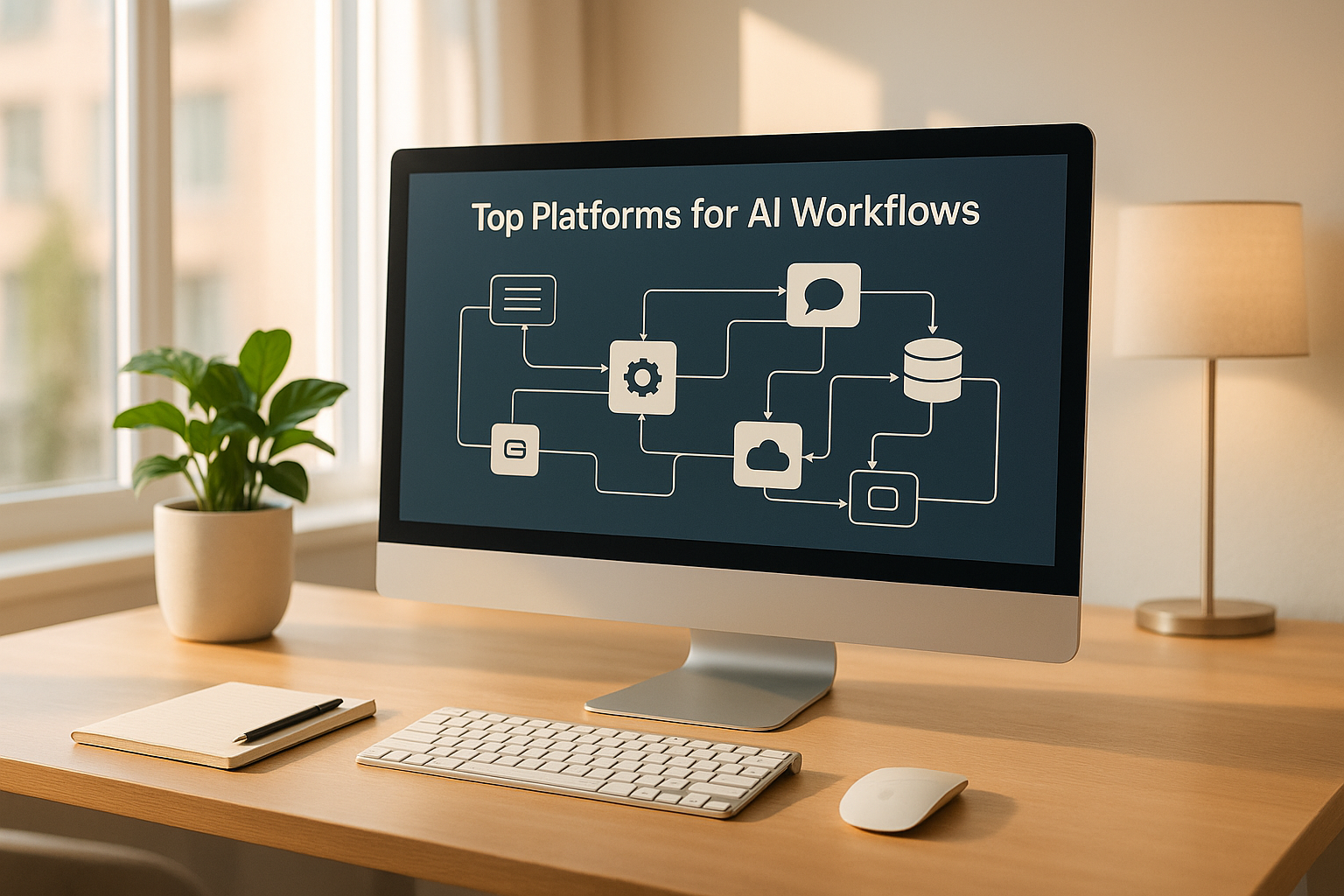
AI workflow platforms are transforming how businesses manage complex operations, reduce costs, and boost efficiency. Companies like Shopify and Instacart are already seeing results, with a Gartner study reporting a 30% cut in operational costs and a 25% productivity increase for U.S. enterprises using AI automation in 2025.
Here’s a breakdown of the top platforms:
| Platform | Key Strengths | Pricing Model | Best For |
|---|---|---|---|
| Prompts.ai | Multi-model orchestration, cost tracking | Pay-as-you-go TOKN | AI-focused teams |
| Monday | Visual builder, project management tools | Tiered subscription | Teams needing automation + PM |
| Make | Scenario-based workflows, app flexibility | Operations-based | Detailed, visual automations |
| Zapier AI | Natural language setup, large app network | Task-based | Non-technical, scalable setups |
| n8n | Open-source, self-hosted flexibility | Free/self-hosted or paid | Technical teams, data control |
Choose based on your needs: governance, cost control, security, or broader automation goals.
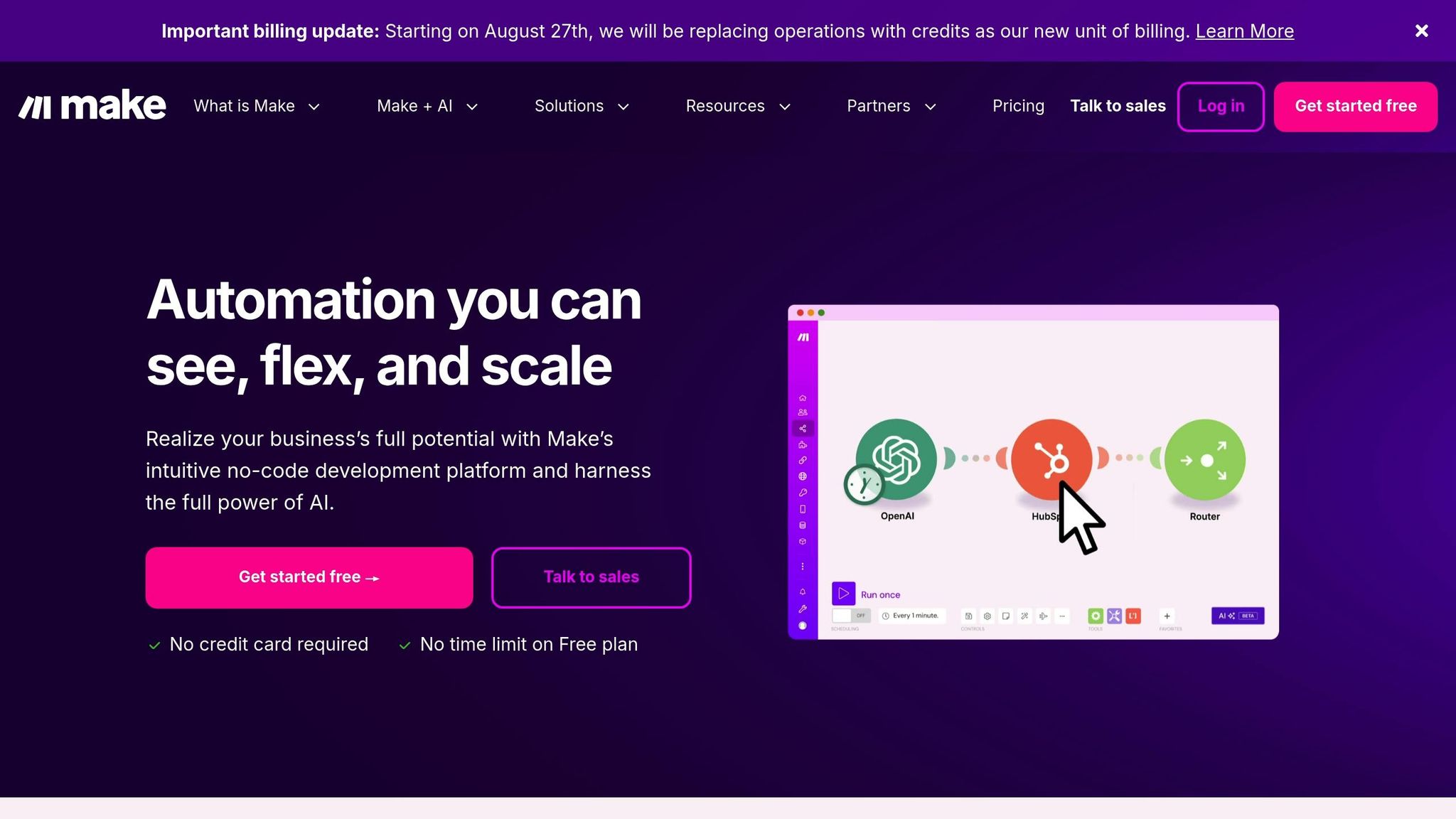
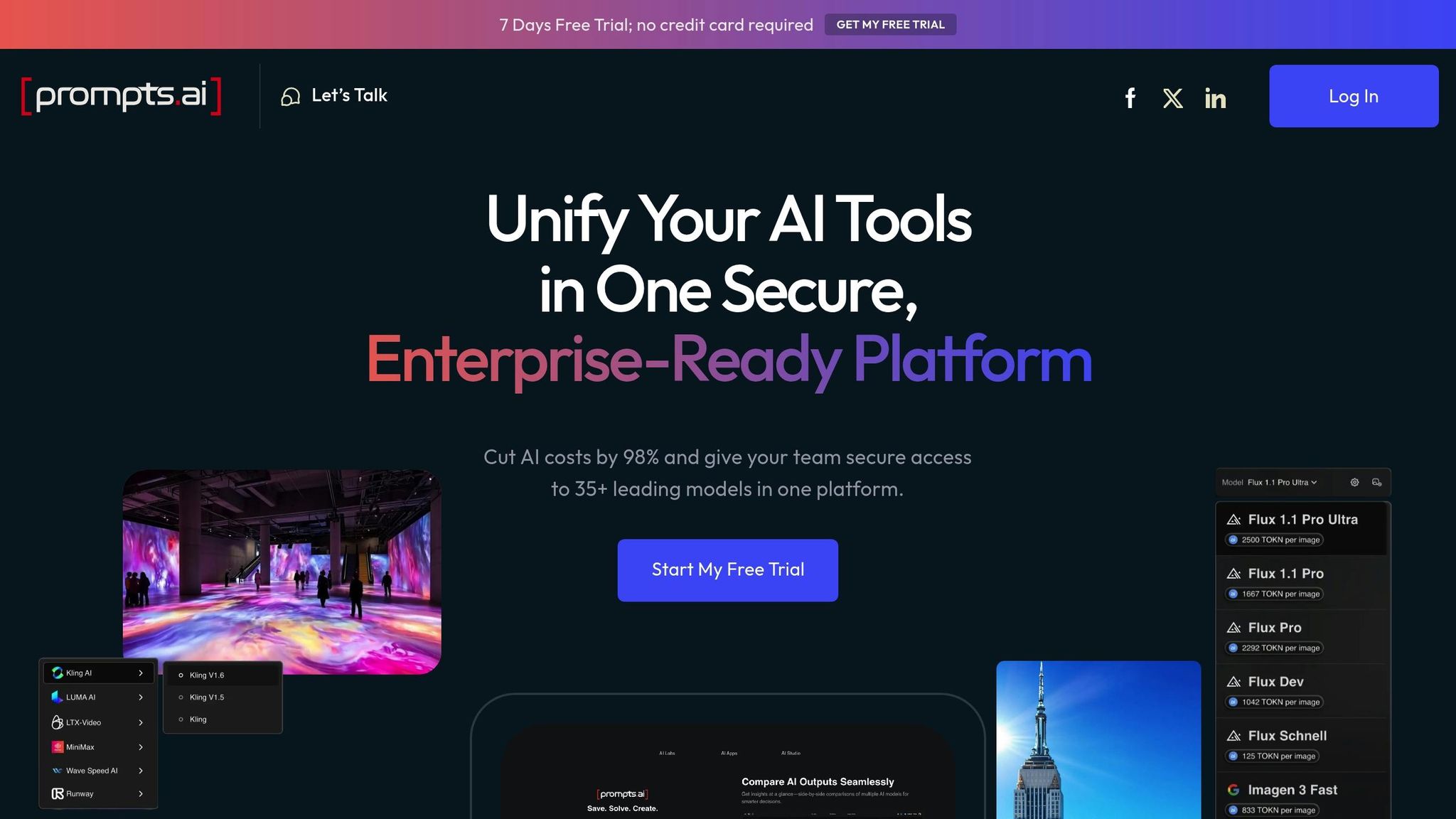
Prompts.ai is a powerful platform designed to simplify enterprise-level AI management. By bringing together over 35 leading language models into one secure and unified interface, it eliminates the hassle of juggling multiple tools. The platform also prioritizes governance and cost control, making it a reliable solution for businesses aiming to streamline their AI operations.
Multi-Model Integration and Workflow Design
Prompts.ai allows teams to seamlessly access models like Flux Pro and Kling without switching between interfaces. This ensures smooth workflows across departments. The platform’s pre-built prompt workflows can be customized and deployed quickly, significantly cutting down implementation time. Additionally, teams can compare the performance of different models side by side, using the same prompt to find the most effective solution for their needs.
Cost Tracking and FinOps Capabilities
With a focus on cost efficiency, Prompts.ai integrates a detailed FinOps layer for real-time tracking of token usage. This granular system monitors costs at the token level, helping businesses optimize their AI budgets while linking expenses directly to outcomes. The platform operates on a pay-as-you-go TOKN credit system, removing the need for recurring subscription fees and aligning costs with actual usage.
Third-Party Integrations and Enterprise Security
Prompts.ai’s API-first design enables teams to integrate AI workflows into their existing processes without disrupting operations. On the security front, the platform offers robust governance features, including comprehensive audit trails to protect sensitive data. It also addresses concerns about data privacy and intellectual property with built-in compliance features that adhere to US regulatory standards.
To further support users, Prompts.ai provides a Prompt Engineer Certification program. This initiative helps organizations develop in-house expertise and establish effective practices for managing AI workflows. By fostering a community-driven approach, the program encourages ongoing learning and collaboration, making it easier for teams to adapt to AI orchestration.
Pricing Structure for US Markets
Prompts.ai’s pricing is tailored to fit various organizational needs. For individuals, there’s a free personal plan for exploration. Businesses can choose from three scalable options:
This tiered structure ensures flexibility for businesses of all sizes, making it easy to find a plan that aligns with their goals.
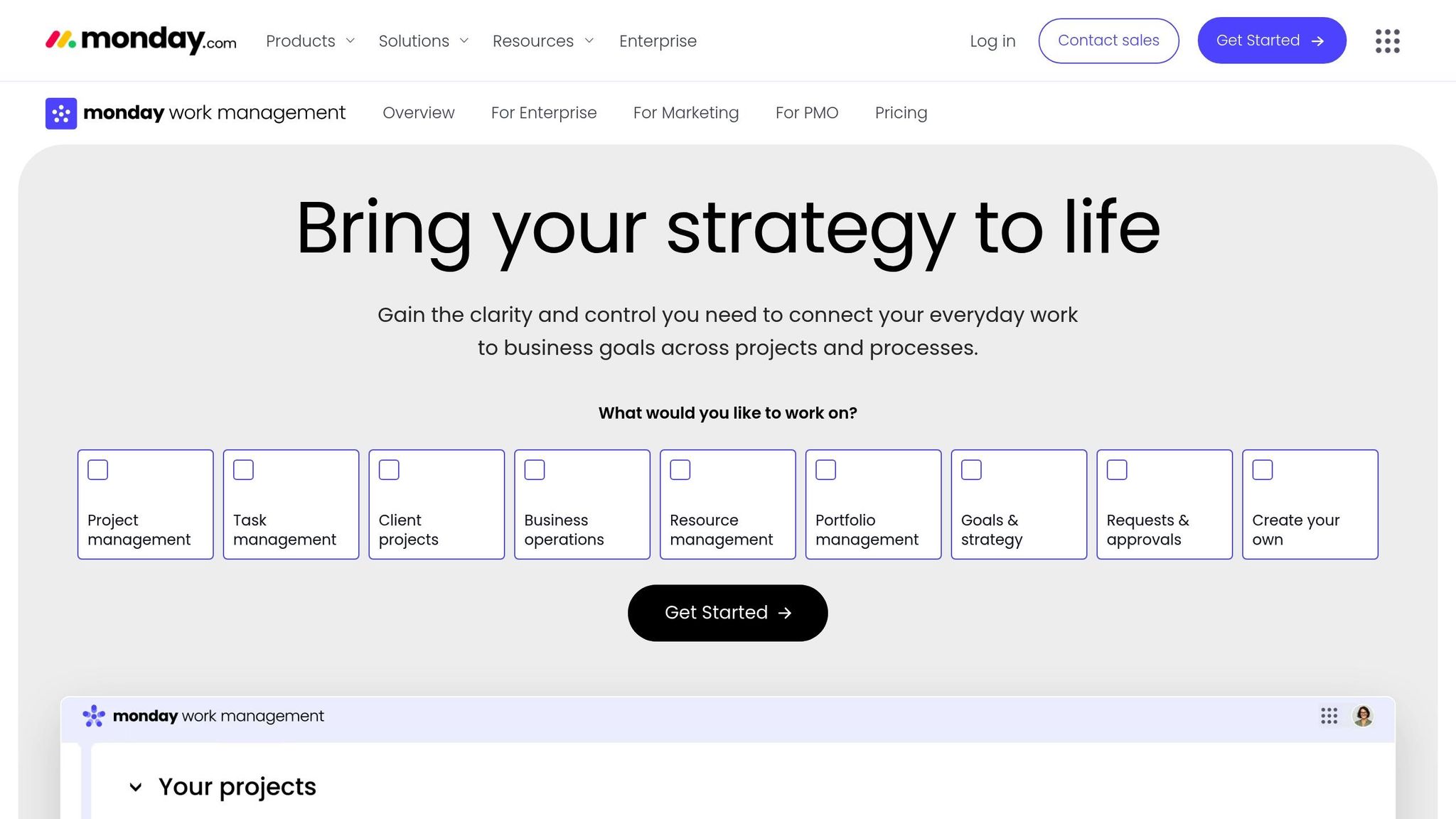
Monday Work Management has grown far beyond its roots in project management, now offering powerful tools for automating workflows. By blending visual project tracking with intuitive automation, it empowers teams to simplify and manage even the most intricate processes. This approach reflects the growing trend in the U.S. for platforms that combine project management with automation to meet the needs of modern enterprises.
At the heart of Monday Work Management is its user-friendly, drag-and-drop workflow builder. This tool allows teams to design automated processes without needing coding expertise. Users can set up triggers based on conditions like status changes, deadlines, or custom rules, ensuring tasks move seamlessly through their lifecycle. For instance, when a new lead is added, the system can automatically assign tasks, schedule follow-ups, and send reminders - cutting down on repetitive manual work.
The platform integrates seamlessly with over 200 popular applications, including Slack, Microsoft Teams, Google Workspace, and Salesforce. It also provides an API for developers to create custom integrations, enabling businesses to pull in external data and automate actions tailored to their specific needs.
Monday Work Management prioritizes security alongside efficiency. Built for enterprise use, it meets SOC 2 Type II standards and complies with GDPR regulations. Features like advanced permission controls allow organizations to manage access based on user roles, while data encryption safeguards information during transfers and storage. Additionally, audit logs track user actions and changes, ensuring accountability and transparency.
The platform offers a tiered subscription model priced per user, with options designed to suit various organizational needs:
A minimum of three users is required, and businesses can save with annual billing compared to monthly payments. To help organizations explore its capabilities, Monday Work Management also provides a free trial of its automation features before committing to a subscription.
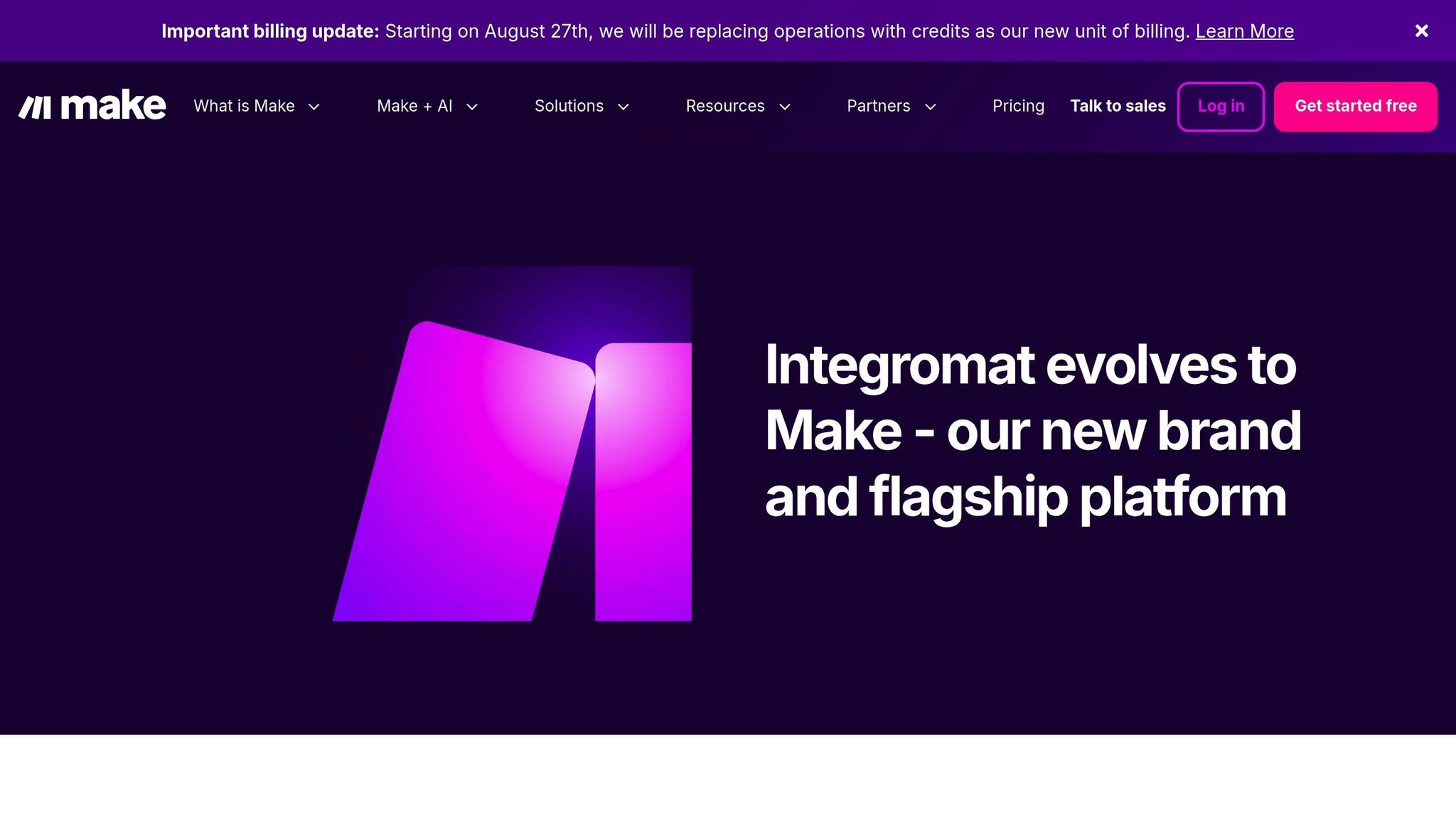
Make is a visual automation platform designed to simplify the creation of intricate workflows through a user-friendly drag-and-drop interface. Previously known as Integromat, it rebranded to Make in 2022 while continuing to prioritize ease of use. Its scenario-based approach allows users to connect multiple applications and services through a straightforward flowchart layout.
Make’s scenario builder presents workflows as a series of interconnected modules, each representing a trigger or action. This visual design makes it easy to follow and adjust even the most complex automation processes. With features like multi-step workflows, conditional branching, and error-handling options, users can create detailed automations - all without writing a single line of code.
The platform supports a wide range of integrations, connecting with popular business tools as well as niche software. Built-in connectors simplify the setup process, while support for custom API connections via HTTP modules ensures compatibility with virtually any web service. This flexibility makes it suitable for diverse automation needs.
Make employs an operations-based pricing structure, where costs are tied to the number of operations performed. This straightforward model allows businesses to predict expenses and scale their automation efforts efficiently as their needs evolve.
Security is a core focus for Make, which includes encryption for data both in transit and at rest, alongside detailed audit logging to meet compliance standards. The platform also offers features to address data residency requirements, making it a reliable choice for secure automation in complex organizational environments.
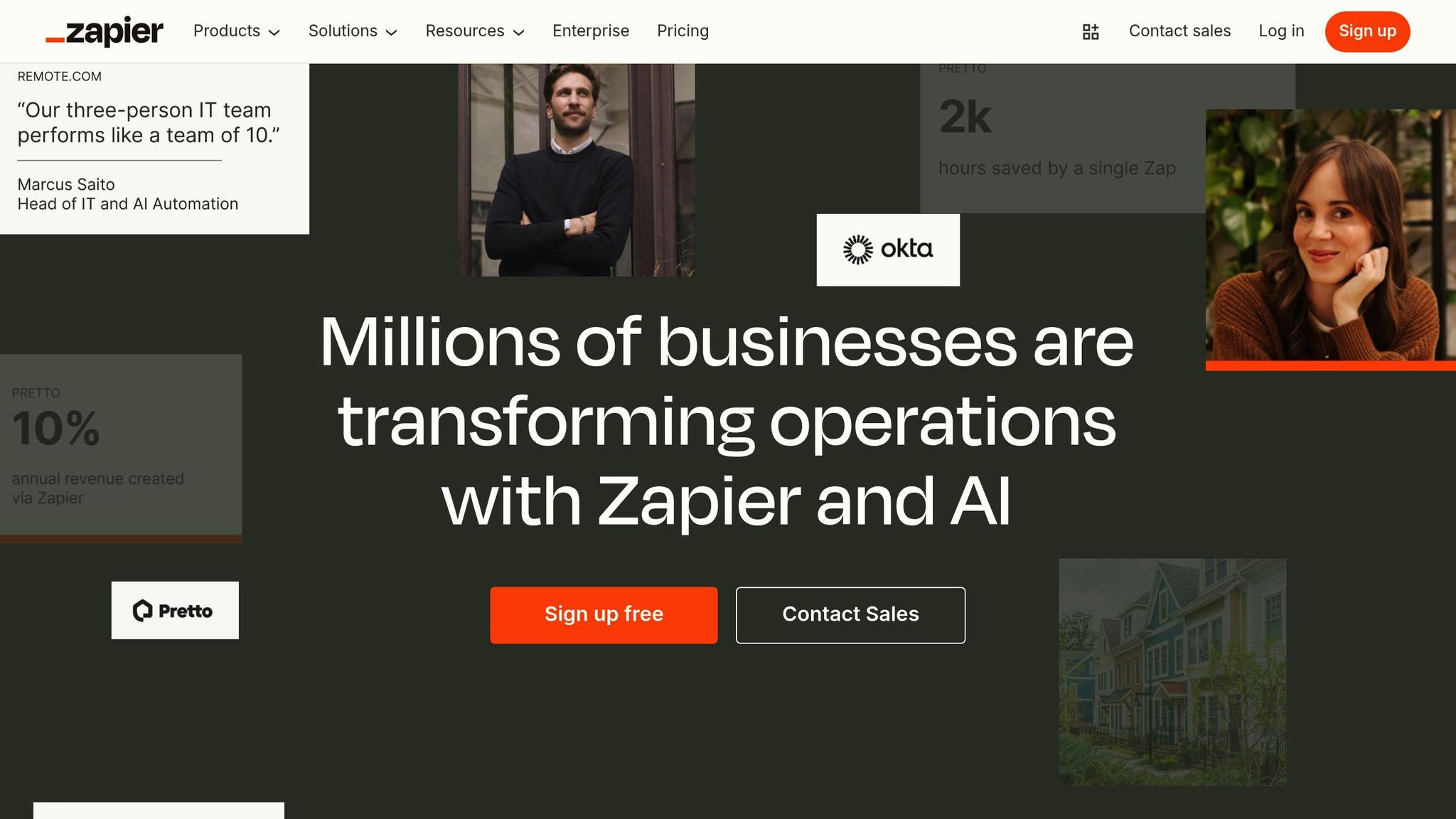
Zapier AI takes workflow automation to the next level by blending artificial intelligence with Zapier's well-known automation capabilities. This integration allows users to create, optimize, and manage workflows with greater ease, leveraging AI to interpret natural language, recommend improvements, and handle complex decision-making tasks.
Zapier AI simplifies automation setup by turning plain English instructions into fully functional workflows. Instead of navigating technical complexities, users can describe their goals in everyday language, and the platform's AI suggests the right triggers, actions, and app connections to bring those ideas to life.
The AI assistant goes further by analyzing connected data and identifying ways to enhance workflows. It may recommend tweaks to existing automations or propose entirely new ones, helping users uncover opportunities they might not have considered. This natural language-driven approach seamlessly integrates with Zapier's vast app ecosystem.
Zapier AI connects with over 6,000 applications, offering one of the largest integration networks available. Its AI capabilities make these connections smarter by automating data mapping between apps, suggesting how information should flow based on context.
Tasks that typically require manual setup, like formatting data or extracting key details from complex inputs, are managed intelligently by the AI. It can analyze content and route data to the appropriate destinations without relying solely on rigid, rule-based logic, providing a more dynamic and efficient automation experience.
Zapier AI operates on a task-based pricing system, where each automated action counts as one task. While the AI-enhanced features are included in the standard pricing tiers, their advanced functionality might use up tasks at a faster rate due to the complexity of decision-making processes.
To help users manage costs, the platform provides detailed analytics that track task consumption and highlight areas for optimization. Monthly task limits vary by subscription tier, ranging from entry-level plans to enterprise packages designed for organizations with high-volume automation needs.
Zapier AI prioritizes security with features like end-to-end encryption for data transfers and storage, along with SOC 2 Type II compliance to meet stringent enterprise security standards. Detailed audit logs provide transparency into workflow execution and data handling.
For businesses with strict compliance requirements, the platform includes advanced features such as single sign-on (SSO), granular user permissions, and data residency controls. These tools ensure that AI-driven workflows remain secure and compliant while offering the flexibility needed for effective automation.
n8n is an open-source AI workflow platform that gives organizations full control over their automation processes. Unlike cloud-only systems, it can be self-hosted, making it an appealing choice for businesses with strict data governance needs or those seeking to customize their automation infrastructure.
As an open-source platform, n8n provides extensive flexibility for technical teams. Organizations can modify its source code, create custom nodes for unique integrations, and design solutions tailored to their specific needs. This adaptability extends to AI workflows, allowing teams to incorporate specialized machine learning models or proprietary AI services that aren't covered by standard connectors.
The platform’s visual workflow editor is a standout feature, combining ease of use with the ability to add custom JavaScript directly within nodes. This hybrid approach caters to both no-code users and developers, enabling advanced logic or data transformations when required. Workflow triggers include webhooks, cron scheduling, and even manual execution, offering multiple ways to initiate AI-driven processes.
n8n excels at connecting with a wide range of AI services. Its extensive node library includes built-in connectors for popular AI tools, making it easy to chain together various operations in a single workflow. Teams can create pipelines that handle text analysis, image recognition, data extraction, and decision-making across multiple AI providers. For even greater flexibility, the platform’s HTTP request nodes and API integration features allow connections to virtually any AI service with a REST API.
n8n offers two deployment models: self-hosted (free, aside from infrastructure costs) and managed cloud subscriptions. The self-hosted option is particularly cost-effective for organizations handling high-volume AI workflows, as it eliminates per-execution fees or task limits. This approach can be more scalable and budget-friendly than pay-per-task models, offering better financial control for enterprises in the United States.
Self-hosting with n8n provides companies with complete control over data security and compliance. Deploying the platform on internal infrastructure ensures that sensitive information stays within the organization. Features like environment variables for secure credential management and role-based access controls (available in the enterprise edition) allow teams to implement tailored security measures, encryption protocols, and audit systems to meet compliance standards.
While n8n offers significant flexibility, it does require a solid technical foundation for optimal use. Self-hosted setups demand expertise in managing server maintenance, updates, backups, and scaling. The platform runs on Node.js and supports databases like PostgreSQL, MySQL, and SQLite. Although the visual interface simplifies workflow creation, leveraging the platform’s full potential often requires familiarity with JavaScript and API integrations.
Prompts.ai brings together more than 35 top-tier language models - such as GPT-4, Claude, LLaMA, and Gemini - into a single, secure platform. This setup simplifies prompt workflows while offering real-time FinOps tools to manage costs. With its pay-as-you-go TOKN credit system, organizations can cut software expenses by up to 98%, all while maintaining strict governance standards.
This focused approach is ideal for organizations looking to refine their AI workflows. However, it may not be the best fit for teams that require solutions beyond AI orchestration, such as broader automation capabilities.
| Platform | Key Strengths | Primary Limitations | Best For |
|---|---|---|---|
| Prompts.ai | Centralized AI orchestration, transparent cost management, strong governance, and streamlined workflows | Limited to AI orchestration; lacks broader automation solutions | Teams focused on centralizing AI workflows |
In addition to its core features, Prompts.ai offers guided onboarding, enterprise training, and access to a vibrant community of prompt engineers. Its optimized integrations ensure smooth connectivity with AI services, making it a strong choice for organizations aiming to streamline their AI operations.
When choosing the right AI workflow platform, it’s essential to consider your organization’s unique needs, technical capabilities, and future growth plans. For AI-driven teams, Prompts.ai stands out with its unified access to over 35 models and strong governance features, making it a reliable choice for streamlined AI operations.
If cost management is a priority, Prompts.ai’s pay-as-you-go model and real-time FinOps tools ensure clear visibility into spending. Unlike traditional subscription-based platforms that can obscure costs, this approach allows organizations to track and manage expenses more effectively.
For businesses aiming to integrate AI into broader automation strategies, evaluate how well the platform supports your overall goals. While Prompts.ai specializes in simplifying AI workflows, organizations with wider automation needs should ensure the platform complements their larger process automation initiatives.
Compliance and security are critical factors, especially for enterprises in regulated industries or handling sensitive data. Prompts.ai offers built-in governance tools that meet stringent enterprise compliance standards, making it a strong contender for organizations with strict regulatory requirements.
Scalability is another key consideration for growing teams. If your organization is starting with small-scale AI projects but plans to expand across departments, you’ll need a platform that can scale without adding complexity. Prompts.ai supports growth by allowing quick additions of models, users, and teams, ensuring a seamless transition as your needs evolve.
For startups and smaller teams, managing costs predictably is crucial. The TOKN credit system offered by Prompts.ai ties costs directly to usage, providing an easy way to control expenses as your projects grow.
Finally, consider your team’s technical expertise. Advanced AI teams often favor platforms with features like side-by-side model comparisons and tools for optimizing prompts. On the other hand, teams new to AI may benefit from platforms that provide guided onboarding and robust community support.
While Prompts.ai excels in many areas, it’s essential to align these features with your broader automation strategy and operational goals. By doing so, you can select the AI workflow platform that best fits your organization’s needs.
Prompts.ai's pay-as-you-go TOKN credit system is designed to align expenses directly with actual usage, offering a budget-friendly and flexible solution for businesses. Unlike subscription models that come with fixed, recurring fees, this approach eliminates unnecessary spending, making it particularly beneficial for organizations with fluctuating AI demands.
With this system, businesses only pay for what they use, enabling potential savings of up to 98% on AI-related costs. It also provides real-time cost tracking, empowering users to manage and scale their AI workflows without the risk of overspending. This makes it an excellent option for those looking for an efficient and scalable way to manage AI expenses.
Prompts.ai delivers seamless multi-model integration paired with user-friendly workflow tools, simplifying how businesses manage their AI operations. By supporting real-time collaboration, automating reports, and providing clear insights into AI processes, the platform helps teams work more efficiently and make smarter decisions.
Key features like customizable workflows, intelligent prompt routing, and cost-saving solutions such as FinOps empower businesses to cut AI expenses by as much as 98%. Leveraging multiple AI models together boosts accuracy, speeds up processes, and enhances problem-solving, driving better results and stronger operational performance.
Prompts.ai places a strong emphasis on data security and regulatory compliance, implementing advanced measures like enterprise-level encryption, multi-factor authentication, and detailed audit logs. These features work together to safeguard sensitive information across all operations.
For businesses operating in highly regulated sectors, Prompts.ai provides tools for automated compliance. This includes real-time monitoring and policy enforcement, enabling organizations to uphold data integrity and meet stringent legal standards, such as GDPR and HIPAA, all while maintaining operational efficiency.


